
16 Jun ADHD in Women: Why It Often Goes Undiagnosed
ADHD IN WOMEN:
Why It Often Goes Undiagnosed

Think of a person living with undiagnosed ADHD. The image you conjure up is likely that of a teenage boy. And you’re not wrong—but one group of people remains untold stories in the ADHD narrative: women.
It’s estimated that nearly two million girls and women in the U.S. live with ADHD. Still, many go undiagnosed and untreated because of misconceptions about what ADHD looks like in women—and even more significantly because they can be overlooked or misdiagnosed altogether. It’s time we start talking about what ADHD looks like in women and how to make sure they get the help they need.
In this article, we’ll discuss why it often goes unrecognized or misdiagnosed in women and explore some of the unique difficulties of living with undiagnosed or unresolved ADHD as a woman. Let’s get started!
ADHD Presents Differently in Women
Living with undiagnosed Attention Deficit Hyperactivity Disorder (ADHD) can be an isolating and chaotic experience, especially if you are a woman. Women are typically more likely to experience inattentive type ADHD, which is often overlooked or misdiagnosed. The most common indications of ADHD in women include difficulties with organization, forgetfulness, and even depression.
What’s more, the symptoms of ADHD vary depending on gender, age, and environment. Women are more likely to struggle with problems such as clutter and disorganization, procrastination, low self-esteem, mood swings, sleep deprivation, and poor time management skills.
These challenges can lead to feelings of helplessness, further inhibiting their ability to focus or stay on task.
While it might seem like living with unrecognized ADHD is a hopeless situation, there are steps you can take to manage your symptoms. With the right professional help, medications, and lifestyle changes, you can better understand your condition and learn how to live an easier life with ADHD.
The Struggle of Living With Undiagnosed ADHD
If you’re a woman with undiagnosed ADHD, you may face unique challenges that often go unnoticed. Many assume that all women have the same ability to focus and manage their time, but this is not the case. Women with undiagnosed ADHD may experience the following:
- Difficulty completing tasks on time
- A tendency to procrastinate
- Trouble focusing during busy or stressful times
- Intense emotions over seemingly insignificant matters
- Difficulty managing relationships and career goals
- Feeling overwhelmed or like they’re “spinning their wheels.”
These challenges can be hard to cope with, especially for women who do not know why they are facing them. Living with undiagnosed ADHD can impact one’s sense of self in various ways, causing sadness, frustration, guilt, and confusion. It can also result in significant stress and burnout if not properly addressed and managed.

Why ADHD in Women is Underdiagnosed and the Consequences
There is a lot of brand around women with ADHD, which can lead to them not getting diagnosed. Women often go undiagnosed because they don’t fit the classic symptoms of hyperactivity, even though they may still have the same problems. It is very important to understand the unique challenges ADHD presents for women and why it often goes undiagnosed.
Research indicates that women are less inclined to be diagnosed with ADHD due to different gender roles. Women may be expected to be more organized and better communicators, which can lead to them being overlooked as potential patients. They are also more likely to be more passive in seeking help, which keeps their condition unrecognized and untreated.
The consequences of this lack of diagnosis are far-reaching — from struggling academically due to difficulty paying attention and focusing on their work, embarrassment from their behavior in social situations, and confusion resulting from misinterpreting instructions or messages from authority figures. They may experience difficulties with job performance because they often can’t get organized or complete tasks on time. Even more seriously, some women might struggle with depression; anxiety has been linked to having difficulty managing emotions due to untreated ADHD.
It’s important that all women feel heard, accepted, and respected — no matter what challenges they face — so they can get the treatment, medication, and help they need to manage their ADHD and live a fulfilling life.
The Emotional Toll of Late Diagnosis: Feelings of Failure and Low Self-Worth
It is no secret that living with undiagnosed ADHD can have a negative emotional effect on women—especially when the diagnosis is delayed. You may be well aware of the feeling of inadequacy and failure related to various aspects of life.
These feelings seem to worsen as symptoms become more apparent and harder to manage without the help of proper medication and treatment. This gap between going undiagnosed for so long can take an emotional toll.
Living with undiagnosed ADHD can lead to a constant inner struggle, a feeling of not belonging, or not measuring up. The resulting anxiety and guilt can be crippling:
- Low self-esteem due to chronic failures in previously “easy” tasks
- The feeling of guilt for being “less than perfect.”
- Anxiety from being overwhelmed by seemingly menial tasks
- A never-ending cycle of disappointment and frustration
These feelings can become all too familiar and frequent without proper diagnosis and treatments. That’s why it is so important for undiagnosed or misdiagnosed people to speak up, do their research, and find the help they deserve—shortening the gap between an accurate diagnosis and successful management of their symptoms associated with ADHD.
Finding the Right Diagnosis and Treatment: It’s Never Too Late
Many women give up on finding a treatment to help them cope with their symptoms because doctors tell them there’s nothing wrong with them. Doctors might often think that what they are experiencing are just effects of depression or anxiety. But if you think or feel that what you experience is more than just depression or anxiety, then you might have some underlying cases of ADHD.
Getting diagnosed and finding the right treatment plan isn’t a one-time thing. Some of us may need more tests or steps to diagnose properly.
- You should try to set several appointments to consult with different doctors to get someone who can understand what you need is the best thing to do.
- It is also ideal to try different treatments like counseling, lifestyle changes, and medication.
- Revisiting the plan regularly to make sure it is tailored to your needs and goals
By doing these steps, you can find the help you need and start living more easily and joyfully than ever!

Societal and Cultural Factors that Contribute to the Underdiagnosis of ADHD in Women
Have you ever wondered why ADHD is so often undiagnosed in women? As it turns out, several societal and cultural factors contribute to this underdiagnosis.
Women’s Behavior
Women are often expected to act in certain ways—like easily switching between multiple tasks or staying cool and composed even when facing pressure. Women can mask the symptoms of ADHD and go undiagnosed.
Girl Power Stigma
There’s also a common belief that girls have it all together, so any semblance of difficulty dealing with their environment is assumed to be a sign of emotional and personal weakness rather than a medical condition. As such, women are often hesitant about seeking help for issues connected to their mental health due to this stigma.
Lack of Awareness
Finally, many medical providers lack awareness about the different forms ADHD can take, particularly in females. Because the signs and symptoms of ADHD in females present differently than in males—such as expressed through social withdrawal rather than hyperactive behavior—are often overlooked or misdiagnosed and can lead to serious consequences if the underlying condition goes untreated.
The importance of recognizing and diagnosing ADHD in women, as untreated ADHD can lead to significant challenges and impairments in daily life
But don’t give up. Women with ADHD can learn strategies to help them manage their symptoms and live full lives. Here are a few:
- Make lists: A daily or weekly schedule can keep you on track and ensure important tasks don’t slip through the cracks.
- Break larger goals into smaller chunks: This can make tasks less daunting and easier to accomplish.
- Set reminders: By leaning on helpful tools like timers, phone alarms, or even a calendar app, you’ll reduce your stress levels significantly
By understanding these challenges and seeking a proper diagnosis, treatment for women with undiagnosed ADHD is possible. Doing so is essential for improving quality of life in the long run!
Check Our Our Other Blogs:
Craig Selinger
Latest posts by Craig Selinger (see all)
- Psychotherapy and Support Services at Cope With School NYC - April 12, 2024
- NYC Parents of Teens Support Group - April 8, 2024
- Here I Am, I Am Me: An Illustrated Guide to Mental Health - April 4, 2024


No Comments